| Srl | Item |
| 1 |
ID:
106499
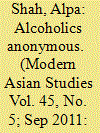

|
|
|
|
|
| Publication |
2011.
|
| Summary/Abstract |
From millenarian movements to the spread of Hindu rightwing militancy, attacks on adivasi (or tribal) consumption of alcohol have gone hand-in-hand with the project of 'civilizing the savage'. Emphasizing the agency and consciousness of adivasi political mobilization, subaltern studies scholarship has historically depicted adivasis as embracing and propelling these reformist measures, marking them as a challenge to the social structure. This paper examines these claims through an analysis of the relationship between alcohol and the spread of the Maoist insurgency in Jharkhand, Eastern India. Similar to other movements of adivasi political mobilization, an anti-drinking campaign is part of the Maoist spread in adivasi areas. This paper makes an argument for focusing on the internal diversity of adivasi political mobilization-in particular intergenerational and gender conflicts-emphasizing the differentiated social meanings of alcohol consumption (and thus of prohibition), as well as the very different attitudes taken by adivasis towards the Maoist campaign. The paper thus questions the binaries of 'sanskritisation' versus adivasis assertion that are prevalent in subaltern studies scholarship, proposing an engagement with adivasi internal politics that could reveal how adivasi political mobilization contains the penetrations of dominant sanskritic values, limitations to those penetrations and other aspirations, such as the desire for particular notions of modernity.
|
|
|
|
|
|
|
|
|
|
|
|
|
|
|
|
| 2 |
ID:
105564
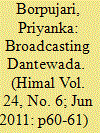

|
|
|
| 3 |
ID:
097619
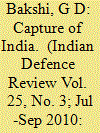

|
|
|
| 4 |
ID:
102318
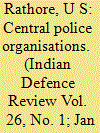

|
|
|
| 5 |
ID:
100414
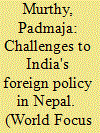

|
|
|
| 6 |
ID:
093840
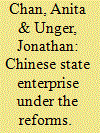

|
|
|
| 7 |
ID:
109226
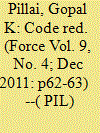

|
|
|
| 8 |
ID:
086830
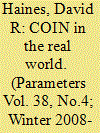

|
|
|
|
|
| Publication |
2009.
|
| Summary/Abstract |
The Nations most likely to be affected by insurgencies, those without extensive resources, refined organization, or a responsible political environment, need a more realistic counterinsurgency (COIN) strategy than that articulated in classic and contemporary counterinsurgency theory.
|
|
|
|
|
|
|
|
|
|
|
|
|
|
|
|
| 9 |
ID:
162444


|
|
|
|
|
| Summary/Abstract |
What are the long-term effects of colonial institutions on insurgency? My article shows the historical origins of insurgency by addressing the puzzle of why the persistent Maoist insurgency, considered to be India’s biggest internal security threat, affects some districts along the central eastern corridor of India but not others. Combining archival and interview data from fieldwork in Maoist zones with an original district-level quantitative data set, I demonstrate that different types of British colonial indirect rule set up the structural conditions of ethnic inequality and state weakness that facilitate emergence of Maoist control. I address the issue of selection bias, by developing a new instrument for the British choice of indirect rule through princely states, based on the exogenous effect of wars in Europe on British decisions in India. This article reconceptualizes colonial indirect rule and also presents new data on rebel control and precolonial rebellions.
|
|
|
|
|
|
|
|
|
|
|
|
|
|
|
|
| 10 |
ID:
094775
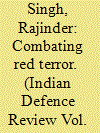

|
|
|
| 11 |
ID:
131467
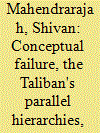

|
|
|
|
|
| Publication |
2014.
|
| Summary/Abstract |
ISAF exists to protect the Afghan constitutional model. This strategic objective will be defeated because the GIRoA model has a conceptual flaw that renders it incapable of delivering governance at the local level (Tier IV). This fatal flaw has enabled the Taliban, by developing parallel hierarchies, to displace GIRoA and establish itself in southern locales as the political authority. The Taliban are fighting a revolutionary war, a Maoist displacement strategy that uses guerrilla tactics to advance a political program. Petraeus and McChrystal failed to recognize the character of war, and believed the Taliban are pursuing an exhaustion strategy. They failed to devise a counter-RW strategy. The 'Surge' was doomed ab initio
|
|
|
|
|
|
|
|
|
|
|
|
|
|
|
|
| 12 |
ID:
129883
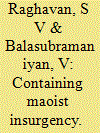

|
|
|
| 13 |
ID:
099198


|
|
|
| 14 |
ID:
102133
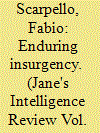

|
|
|
| 15 |
ID:
102138
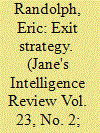

|
|
|
| 16 |
ID:
115415
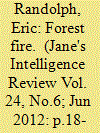

|
|
|
| 17 |
ID:
097336
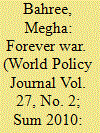

|
|
|
| 18 |
ID:
127081
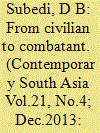

|
|
|
|
|
| Publication |
2013.
|
| Summary/Abstract |
Although combatants played a vital role in the People's War (PW) waged by the Maoists in Nepal, there is a dearth of knowledge about what motivated or compelled people to join the war, as well as what made the Maoists so successful in recruiting and mobilising committed insurgents. Engaging with these questions, this paper aims to understand the causes and drivers of combatant recruitment in the PW. The existing literature demonstrates that armed recruitment and participation in conflict is a phenomenon driven by structural and environmental factors in addition to other conditions, including class-based oppression as well as caste and ethnic grievances. This study, however, contends that in the Nepalese context, while such structural inequalities and disparities created favourable conditions for the PW to escalate, these factors alone cannot sufficiently explain: (a) how and in what ways the Maoists radicalised people or coerced them into becoming combatants and (b) what role the insurgent organisation and the state played in the recruitment dynamics. It argues that an understanding of armed recruitment and participation in the PW should also take into account certain mobilising factors, such as the Maoists' ideology and radicalisation campaigns. Furthermore, it situates the recruitment of combatants within the security paradigm and establishes that the insecurity and violence, caused by both the insurgent organisation and the state, explain voluntary as well as involuntary modes of armed recruitment in the PW.
|
|
|
|
|
|
|
|
|
|
|
|
|
|
|
|
| 19 |
ID:
102236
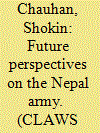

|
|
|
| 20 |
ID:
157480
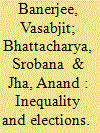

|
|
|
|
|
| Summary/Abstract |
This article investigates the causes of India's Maoist insurgency and its changing dynamics. To explain its origins, we empirically test three hypotheses using cross-state-level data: inequality of wealth in states; inefficient state government; and, disgruntled provocateurs. Our analysis reveals that insurgency is caused by inequality of wealth in states, not inefficient state governments and disgruntled provocateurs. Subsequently, we study variations in the number of Maoist attacks and the selected targets in the eastern Indian state of West Bengal using newspaper reports of events. Our analysis demonstrates that the numbers of incidents and the type of targets selected depend on electoral competition between regional political parties and their interactions with Maoists. The findings, therefore, indicate that whereas inequality of wealth can explain the insurgency's presence in states, political competition within states could explain its dynamics.
|
|
|
|
|
|
|
|
|
|
|
|
|
|
|
|